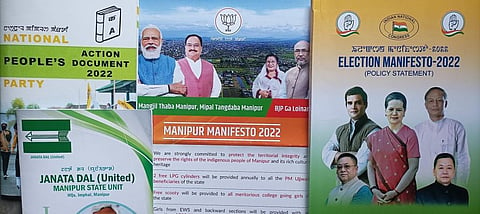

Political parties in Manipur have promised to conserve the environment, natural resources such as forests and Loktak, the largest freshwater lake in eastern India, in their manifestos released ahead of the legislative assembly elections.
Manipur will go to the polls February 28, 2022, at 38 assembly constituencies and March 5 at 22 constituencies. The counting will take place March 10.
Some 265 candidates, including 17 women, will contest in the 12th state assembly elections to elect 60 legislators. A total of 173 candidates, including 15 women, will contest in the first phase while 92 candidates, including two women, will contest in the second phase.
A total of 2,048,169 voters will exercise their right to franchise in the Manipur polls.
The incumbent Bharatiya Janata Party (BJP) has promised to protect and preserve the rich and unique natural resources of Manipur in its manifesto.
It has also said it would strictly monitor the illegal felling of trees in all protected forests, reserve forests and open forests and will also monitor forest fires.
The BJP’s 30-page manifesto has 20 key promises in a separate leaflet. The saffron party, which has fielded candidates in all 60 assembly constituencies, has promised to formulate a comprehensive action plan to safeguard the state’s flora and fauna and endangered species and has promised a strict ban on the usage of single-use plastics.
The BJP has also promised to develop the Loktak lake holistically to ensure that it becomes an iconic wetland site of south Asia.
The party has also promised the overall development of the lake by restructuring the Loktak Development Authority for comprehensive conservation and management of the lake and its associated wetlands.
The BJP has also promised “to convert the Champu Khangpok floating village at Loktak Lake into a heritage floating village to conserve and promote the local heritage.”
The opposition Congress, which has fielded 54 candidates in the state’s 60 assembly constituencies, has also promised “to create a state forest development corporation and Loktak lake research and training centre” besides formulating Manipur’s state energy policy if they are voted to power this time.
The Congress’ 30-page manifesto, released February 4, has 30 promises, with 11 goals in 37 different sectors.
The grand old party has promised a “mountain economy for the integrated development of the land and people of the hill districts”.
It has also promised to introduce sustainable forest certification to identify and label genuine sustainable forest, recognise ‘village authority’ including ‘Thoubei’, a village implementing body as a stakeholder in forest development and sustainability schemes in the hills.
The Congress has also promised to provide fuel wood economy cooking stoves and technology to the hills and their adjacent rural areas to reduce deforestation, smoke-borne disease and pollution and also prohibit environmentally hazardous economic plantations in forest and non-forest areas.
Notably, most of the political parties have included the challenges that the Loktak lake faces in their elections manifestos this time.
For instance, the National People’s Party (NPP), a key ally of the ruling BJP-led coalition government in Manipur, promised in its 25-page manifesto “to review the Loktak Protection Act of 2006 and amend the legislation to make it more scientific and people-centric and align it with the Ramsar Convention and the National Wetlands Rules 2017.”
The NPP, which has fielded 38 candidates in the polls, has promised to work to restructure the Loktak Development Authority and ensure its functioning is based on environmental and scientific concerns and community needs.
It has promised to work towards the enactment and enforcement of legislations to protect wetland systems and ensure proper management of inland water systems in municipal areas, with the specific aim of curbing pollution.
The NPP has also promised to review, redraft and update the state action plan on climate change according to changing needs.
It will also work towards better public transport systems and pedestrian-friendly townships to reduce the state’s carbon footprint, besides a scientific review of neo-liberal policies such as the Manipur Hydroelectric Power Policy 2012.
Other parties such as Janata Dal (United) which has also fielded 38 candidates, has promised to promote the Geographical Indication (GI) status of local species as GI tags have a great potential to play a major role in trade.
The Nationalist Congress Party, which has nominated eight candidates, has promised to preserve the ‘aged old woods’ for a healthy environment.
Interestingly, the Communist Party of India, a pre-poll partner of the Congress in the forthcoming elections, has promised to take special steps to protect and preserve forests to face global climate change.
It has also promised massive tree plantations at the catchment areas of the major rivers in the state. It will also promote horticultural crops in the state’s wastelands.